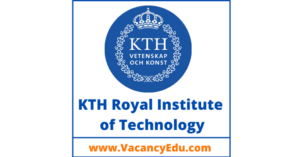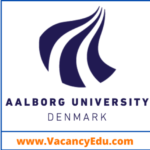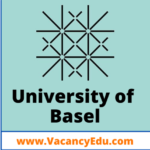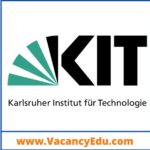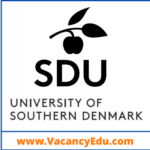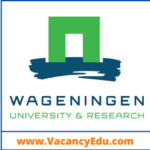KTH Royal Institute of Technology, Stockholm, Sweden invites online Application for number of Fully Funded PhD Degree at various Departments. We are providing a list of Fully Funded PhD Programs available at KTH Royal Institute of Technology, Stockholm, Sweden.
Eligible candidate may Apply as soon as possible.
(01) PhD Degree – Fully Funded
PhD position summary/title: Doctoral student in computational cognitive neuroscience
This position offers a unique opportunity to leverage the synergy between experimental and computational approaches to fundamental questions about human cognitive capabilities. In particular, the successful applicant will capitalise on the vibrant interdisciplinary environment sustained by a strategic collaboration between the Computational Brain Science lab, School of Electrical Engineering and Computer Science at KTH Royal Institute of Technology and International Research Centre for Neurointelligence, University of Tokyo.
The goal of the project is to develop mathematical models of the brain and use them for large-scale simulations of cortical memory function. Special focus is on coupling multiple neural networks to study neural interactions between different cortical regions supporting cognitive function. You are expected to build and simulate neural networks models, interpret the findings and evaluate the model’s compatibility with heterogeneous experimental data. The position also implies the need to write scientific papers in English. Due to the collaborative nature of the project, a doctoral student is expected up to a year at the collaborating group in the International Research Centre for Neurointelligence, University of Tokyo.
Deadline : 24.Oct.2025
(02) PhD Degree – Fully Funded
PhD position summary/title: Doctoral student in Decision Support for New Nuclear in Sweden
Nuclear power is experiencing a renaissance worldwide as one of the key solutions to achieve fossil-free electricity generation. The geopolitical effects on energy prices, the increased demand for clean, abundant energy, and the binding targets to reach net-zero emissions by 2050 are among the driving forces for this renaissance of nuclear power. After a long period with no new deployments in nuclear and a huge increase in capacity from renewable energy resources, in addition to storage technology and power electronic solutions, the deployment of new nuclear power implies entering into an unexplored field for research and development. Moreover, a long-term outlook shows that new technologies like small modular reactors (SMR) can play a pivotal role in enabling a new era for nuclear energy. There are multiple alternatives in the future deployment of nuclear, including centralized large-scale and distributed SMRs, and there is no established knowledge of how these would impact the power grid reliability, and consequently, the security of power stability, which could have a key influence on radiation safety. This project aims to generate knowledge on how new nuclear power should be integrated into the Swedish power grid without compromising radiation safety.
The project focuses on quantitative models and tools for decision support, e.g., comparing different technologies, alternative locations, and the system impact of various alternatives. This would help identify the social impact and the resulting value for society. Furthermore, the project would bridge the gap between the extensive knowledge of security and material science aspects of nuclear power. This knowledge would aim to support the process of deploying new nuclear. This would involve consideration of several system questions, like, e.g., which type of technology to select, where to locate the nuclear reactors (e.g., centralized vs. distributed nuclear, off- or on-the-grid), the number of co-located reactors, and defence in depth.
Deadline : 16.Oct.2025
View All Fully Funded PhD Positions Click Here
(03) PhD Degree – Fully Funded
PhD position summary/title: Doctoral student in grid forming windfarms under large grid disturbance
The electricity grid is increasingly exposed to large disturbances as renewable penetration grows and power electronic converters become dominant. Wind farms, especially those based on grid-forming technology, are expected to play a key role in stabilising the future system. However, their behaviour under severe transients is not yet fully understood. In this doctoral project we will investigate how grid-forming wind turbine generators and battery energy storage systems interact with traditional grid-following units when the grid experiences large disturbances. A particular focus will be on characterising large-signal dynamics and analysing the transient stability of wind farms, taking into account the physical limitations of both wind turbine generators and energy storage systems. The aim is to develop robust control methods that enable reliable synchronisation and ensure that grid-forming wind farms can withstand and stabilise the system during challenging events. The expected outcome is a set of reduced-order models and design-oriented analysis tools that provide new insight into the stability of grid-forming wind farms, along with control strategies that strengthen their disturbance-handling capability. The work will be carried out with in a MSCA-DN doctoral training network with research stays at DNV in the Netherlands, Aalborg University in Denmark, and Imperial College London in the UK.
Deadline : 10.Oct.2025
(04) PhD Degree – Fully Funded
PhD position summary/title: Doctoral student in Multidimensional Magnetic Resonance Elastography
Magnetic resonance elastography (MRE) is a technique of magnetic resonance imaging (MRI) to estimate mechanical properties of tissues. Multidimensional diffusion MRI (MD-dMRI) is a novel MRI modality that extracts diffusion information of tissues at a subvoxel level. This project aims to combine both techniques to extract mechanical information of the brain. The tasks are:
- DWI-MRE: Adapt current MRE sequences to estimate both MRE and diffusion-weighted images (DWI) at once.
- MD-MRE: Adapt DWI-MRE to use free gradient waveforms as done in MD-dMRI.
- Process MD-MRE using computational and data-driven models.
Deadline : 05.Oct.2025
(05) PhD Degree – Fully Funded
PhD position summary/title: Doctoral students in neuromorphic computing
The EU MSCA Doctoral Network ELEVATE addresses neuromorphic event-based sensing and computation for low-power and low-latency applications. The here advertised doctoral projects focus on sensory perception for closed-loop robotic systems:
(1) Event vision for low-latency human / robot co-working scenarios
Convolutional neural networks for computer vision require substantial computing resources and introduce significant latencies even in modern GPU systems. This project investigates neuromorphic sensors and sensor fusion of multiple event-cameras in a real-time human-robot co-working space, where a robotic manipulator (a 7 DOF robotic arm) interacts with a human subject and multiple hand-held tools.
(2) Real-time stereo event vision for active mobile robotic perception
Real-time computer vision on-board of fast-moving mobile robots faces challenges, e.g. because of limited computing resources and perceived motion blur. This project aims to improve nearby terrain understanding for a quadruped (walking) robot, based on information from multiple embedded event cameras processed in low-latency spiking neural networks (SNN).
Both projects will be based at KTH, Stockholm, and include mandatory research stays (secondments) at universities and companies within Europe.
Deadline : 03.Oct.2025
Polite Follow-Up Email to Professor : When and How You should Write
Click here to know “How to write a Postdoc Job Application or Email”
(06) PhD Degree – Fully Funded
PhD position summary/title: Doctoral student in High-Performance Computing
A Ph.D. position is available in the area of high-performance computing, with a focus on performance analysis, development, and optimization of scientific simulation codes. The work involves applications in plasma physics, computational fluid dynamics, and molecular dynamics, targeting large-scale systems equipped with GPUs and other accelerators. Key research topics include mixed-precision numerical methods, integrating machine learning into computational workflows, and coupling quantum computing with high-performance computing systems for scientific applications.
Deadline : 02.Oct.2025
(07) PhD Degree – Fully Funded
PhD position summary/title: Doctoral student in Optimization and Control of Complex Systems
The doctoral student will conduct research at the intersection of optimization, game theory, and automatic control for complex systems. Their work will encompass both the mathematical foundations of these fields, e.g., designing innovative algorithms and control strategies, as well as the development of technical solutions to adapt these new methods to applications in the areas of energy systems, mobility, and data centers. The research project will address one or more of the specific research areas in the following (non-exhaustive) list:
- Algorithmic fundamentals of game theory and optimization;
- Computational control of large-scale multi-agent systems;
- Incentive and mechanism design;
- Defining, measuring, and operationalizing fairness in control systems;
- Applications to energy systems, mobility, and data centers.
Deadline : 02.Oct.2025
(08) PhD Degree – Fully Funded
PhD position summary/title: Doctoral student in 6G Communication Systems
Wireless communication technology has evolved over five generations, but the demand for higher efficiency, availability, and reliability is never-ending. The physical layer of 5G and 6G networks revolves around the multi-antenna MIMO technology. 5G uses 64 antennas in each base station and 4 antennas in devices, which might grow by 5-10 times in 6G. These antennas can be used for beamforming, spatial multiplexing, and integrated communication and sensing (ISAC).
In this doctoral project, you will contribute to cutting-edge 6G MIMO technology research and develop new communication theory and signal processing algorithms. The goal will be to develop theory, algorithms, and network architectural concepts to deliver ubiquitous network services across the globe. A hypothesis is that the solution will build on a next-generation cell-free MIMO technology, uniting the ground-based distributed base stations and low-earth-orbit satellites. Methods from MIMO communication theory, array signal processing, optimization, and machine learning will likely play a vital role. The research will mainly be theoretical, but KTH has testbeds for potential experiments. However, we are not looking for microwave engineers because no antennas or hardware will be built.
Research will be performed under the 6G DICE project, where we will investigate the joint management of cloud, processing, and radio resources in ground-based and satellite communication networks, targeting flexible orchestration of computing and communication to meet the stringent performance and sustainability demands of future AI-driven applications.
Deadline : 02.Oct.2025
Click here to know “How to Write an Effective Cover Letter”
(09) PhD Degree – Fully Funded
PhD position summary/title: Doctoral student in mobile wireless sub-THz MIMO communication for 6G
Wireless technology has evolved over five generations, but the need for higher efficiency and reliability is never-ending. The 6G research goal is to identify new groundbreaking methods that can enable tomorrow’s wireless applications. Specifically, the interest toward even higher frequencies beyond millimeter wave remains high for 6G and beyond. This particularly includes sub-terahertz (sub-THz, 100 GHz – 300 GHz) and terahertz (THz, 300 GHz – 3 THz) bands that theoretically enable both extremely high-rate connectivity and extremely high-resolution sensing.
In this doctoral project, you will contribute to the theory formation for mobile sub-THz and THz wireless communication systems for 6G and beyond and establish yourself at the international forefront. Some possible research sub-areas are related to physically large antenna arrays, near-field THz communications, intelligent reflecting surfaces (IRSs), joint terahertz communication and wireless sensing (ISAC), massive and distributed MIMO at sub-terahertz frequencies, and terahertz communications for satellite networks. The research will focus on the physical layer and media access control layer. Methods from probability theory, communication theory, electromagnetics, optimization and machine learning will play an important role.
We are ultimately looking to either one of the two broad research areas:
- Mobile near-field THz communications and THz wavefront engineering,
- Mobile satellite and airborne THz communications,
Deadline : 02.Oct.2025
(10) PhD Degree – Fully Funded
PhD position summary/title: Doctoral student in AI-supported decarbonization strategies for industries
Decarbonizing industry requires more than technologies – it demands integrated strategies spanning energy carriers, digital infrastructure, and business models. Traditional siloed approaches have proven insufficient in addressing the complexity of this transition. This PhD addresses this challenge by exploring novel decarbonization pathways that leverage the integrated use of fluctuating renewable energy carriers—electricity, hydrogen, and heat—within industrial clusters. How can AI-based coordination and control of multiple variable energy carriers reduce CO₂ emissions while ensuring a stable energy supply? The project will advance reinforcement learning methods and model-based optimization to support short- and long-term decision-making, developing new integrated designs and operation of complex industrial sites. The project is in collaboration with DTU Construct and research stays are planned.
Deadline : 01.Oct.2025
Connect with Us for Latest Job updates
(11) PhD Degree – Fully Funded
PhD position summary/title: Doctoral student in Flexible technologies for industrial heat decarbonization
To achieve rapid decarbonization of the industrial sector, technically efficient and cost-effective solutions integrating renewable energy sources, electrification of heat, and energy storage are deemed. We aim to design and prototype different technologies, including low and high temperature thermal energy storage and integrated systems. The doctoral student will have a broad perspective focusing on technological development, laboratory testing and techno-economic analysis to identify optimal integration opportunities. The main goals of the doctoral work will be to design, prototype and test thermal energy storage and integrated systems including heat pumps and to perform system level techno-economic assessment. During the work, the PhD candidate is expected to have international cooperation with EU partners.
Deadline : 01.Oct.2025
Polite Follow-Up Email to Professor : When and How You should Write
(12) PhD Degree – Fully Funded
PhD position summary/title: Doctoral student in Multi-sector optimization for Positive Energy Districts
To accelerate clean energy transition through Positive Energy Districts (PEDs), the EU-funded EMPEDOFLEX project develops a comprehensive digital toolbox integrating machine learning, optimization algorithms, and interoperability frameworks for optimal energy management across Europe. KTH leads technological landscape analysis, multi-energy investment planning tool development, and validation activities across four European sites.
The doctoral student will contribute to energy system optimization research, developing AI-driven forecasting algorithms, designing optimization models for multi-energy investment planning, and conducting data analytics for large-scale energy datasets. The research includes developing Long-Term Strategy (LTS) tools for PED planning and techno-economic assessment of energy community solutions. The PhD candidate will engage in international cooperation with EU partners across Italy, Portugal, Greece, Belgium, and Sweden, while contributing to validation activities at the Tamarinden Energy Community in Örebro.
Deadline : 01.Oct.2025
(13) PhD Degree – Fully Funded
PhD position summary/title: Doctoral students in Theoretical Condensed Matter Physics
The group of Egor Babaev at the Department of Physics of KTH Royal Institute of Technology has an opening for two Doctoral students in the field of theoretical condensed matter physics. The group carries a broad spectrum of research using analytical and numerical methods ranging from effective field theory, topological solitons, statistical mechanics of the phase transitions, topological systems to modern microscopic quantum many-body techniques.
One of our research topics is the emerging field of composite order: In a recent year, experimental
discoveries were made that revised half-century-old paradigms: the discovery of electron quadrupling condensate, and topological defects carrying an arbitrary fraction of magnetic flux quantum. The discovery opened up many fundamental questions on the nature of this new state of matter and its possible applications. Other topics include other new quantum symmetry-breaking and topologicallyordered states, unconventional phase transitions, and application of newly developed methods, such as Diagrammatic Monte-Carlo to understand the long-standing problems. Collaboration with local and international theoretical and experimental groups involved in the project is encouraged.
Deadline : 01.Oct.2025
(14) PhD Degree – Fully Funded
PhD position summary/title: Doctoral student in Robot Learning for Manipulation
PhD students will work on robot learning for manipulation, exploring recent advances in Vision-Language-Action (VLA) models for tabletop manipulation tasks with a focus on using the whole-body motion to enhance perception and control for solving complex mobile manipulation tasks. We are seeking candidates with a strong background in robotics and machine learning, and demonstrated experience in two or more of the following areas: deep learning, reinforcement learning, robot perception, navigation or manipulation.
Deadline : 30.Sep.2025
(15) PhD Degree – Fully Funded
PhD position summary/title: Doctoral student in AI-Driven nanomagnetism
We are seeking a motivated PhD student in computational materials physics, particularly AI-driven studies of nanomagnetism. The PhD student will work within an active research group in materials theory and computational magnetism, led by Dr. Alexander Edström and Prof. Anna Delin at the Division of Light and Matter Physics, which also hosts experimental research groups in closely related areas. The position is linked to a research project (through WISE and WASP) in collaboration with experts in both machine learning and artificial intelligence (Pawel Herman at KTH’s Department of Computer Science and Stephanie Lowry at Örebro University), as well as computational magnetism and spin dynamics (Maryna Pankratova and Anders Bergman at the Department of Physics, Uppsala University).
The project aims to apply advanced methods in AI and machine learning, combined with atomistic spin dynamics and first-principles electronic structure calculations, to study complex nanomagnetism. A specific goal of the project is to design materials functionality for future sustainable computing technologies, such as magnetic materials for neuromorphic computing.
Deadline : 28.Sep.2025
(16) PhD Degree – Fully Funded
PhD position summary/title: Doctoral student in resilient microgrids
The project offers doctoral studies within the Marie Skłodowska-Curie Actions (MSCA) funded network program for PhD students, IDEAL4GREEN, that addresses the urgent challenges of climate change and the global shift towards sustainable energy systems. It focuses on developing and integrating microgrids, which are crucial in managing the variability of renewable resources and achieving decarbonization targets.
Future power systems could be more vulnerable due to the wide integration of renewable energy, electric vehicles, coupled cyber-physical networks, increasing extreme events (disaster, cyberattacks). Microgrids, which integrate various energy sources (e.g. renewable energy, energy storage, local controllable loads) can be either grid connected or island mode operated, provide a possible solution to achieve self-sufficiency and enhance grid resilience. This project aims to develop optimal coordination and control strategies for microgrids to achieve self-balancing when they are disconnected from the grids, and grid support functions when they are connected to the grid.
Deadline : 26.Sep.2025
(17) PhD Degree – Fully Funded
PhD position summary/title: PhD – Reliable conversational domain-specific data exploration and analysis
We are looking for a highly-qualified and motivated individual to pursue a PhD in the area of reliable conversational domain-specific data exploration and analysis. The prospect PhD student will join a research team in KTH led by Professor Aristides Gionis. The position is part of the European project ARMADA funded by the Marie-Skłodowska-Curie Doctoral Network.
The ARMADA project operates within the fast-growing field of Conversational AI, aiming to address critical issues related to the reliability and quality of large language models (LLMs) such as ChatGPT and Gemini. These models are increasingly used in essential sectors like healthcare, education, and law, where inaccurate or misleading responses –- known as “hallucinations” –- can have serious consequences. ARMADA seeks to develop solutions that make these AI systems more trustworthy, coherent, and verifiable by involving users directly in the response validation process and ensuring that every answer is traceable to a clear source and justification.
The project will focus on interdisciplinary approaches that combine artificial intelligence, machine learning, natural language processing, and social sciences. This collaborative and cross-sectoral approach aims to produce robust methods for evaluating AI outputs while also promoting inclusivity and ethical design.
Deadline : 25.Sep.2025
(18) PhD Degree – Fully Funded
PhD position summary/title: Doctoral student in Machine Learning
The PhD students will be a part of an EU project “Digitising Smell: From Natural Statistics of Olfactory Perceptual Space to Digital Transmission of Odors”. The goal of the project is to digitalize the sense of smell, pave the ground for understanding how the sense of smell works in humans and build AI models of these.
Deadline : 25.Sep.2025
(19) PhD Degree – Fully Funded
PhD position summary/title: Doctoral student in systems perspective to technology for aging
With an aging population, we need technology to maintain good care and good health. But which technology is actually best suited to meet this societal challenge where there are many stakeholders and societal sectors that have an impact?
In this project, we explore the systems perspective on technology development in aging and the stakeholder perspective. We are looking for you who have both digital competence and research interest in system dynamic modeling.
The doctoral student will work within a FORTE funded program, in close collaboration with Karolinska Institutet.
Deadline : 25.Sep.2025
How to increase Brain Power – Secrets of Brain Unlocked
(20) PhD Degree – Fully Funded
PhD position summary/title: Doctoral student in Chemistry with specialization in Nuclear Chemistry
In water-cooled nuclear reactors, corrosion leads to the formation of oxide deposits (CRUD) on the fuel cladding. This leads to reduced heat-transfer which in turn can result in fuel damage. It also leads to radioactivity build-up which in the long run becomes an occupational health problem. In this project, CRUD-formation and chemical stability will be studied experimentally as a function of water chemistry (including radiation chemistry) with the purpose of developing a model to predict CRUD-composition and stability on the basis of water chemistry and thereby identify optimal conditions.
We are looking for a person with a strong background in chemistry who enjoys experimental work.
Deadline : 25.Sep.2025
(21) PhD Degree – Fully Funded
PhD position summary/title: Doctoral student in organic chemistry for modification of biobased materials
We seek a skilled doctoral student with a genuine interest in organic chemistry to carry out research in synthetic photocatalysis, a contemporary international research field where visible light is used to drive chemical reactions. As doctoral student you will develop new sustainable methods for selective organic synthesis applied to biosourced materials. Through your work you will contribute with fundamental insights and methods for sustainable synthesis and development of new biosourced material.
The project concerns the development of new synthetic organic methodology with an emphasis on approaches for selective and controlled functionalization of strong chemical bonds using photocatalysis.
Deadline : 25.Sep.2025
(22) PhD Degree – Fully Funded
PhD position summary/title: Doctoral student in CFD simulation of Carbon Capture and Utilisation
KTH is leading the newly built research center ACCELERATE with aim to accelerate the transformation of the chemical industry. Carbon Capture and Utilization (CCU) is a novel track for producing chemicals while phasing-out fossil feedstocks. ACCELERATE gathers leading academics and industries that want to join forces. Within this effort, this position will focus on multi-physics simulations (CFD) of new solutions for capturing biogenic CO2 from point sources. The work will consist in creating simulations tools based on CFD to simulate details on CO2 capture by solvents in complex geometries, e.g. spray towers, foams.
The simulation tools will include detailed modelling of the transport (in gas and liquid phases). Heat-and-mass transfer through the interface, multi-component vapour-liquid equilibrium as well as chemical reactions. Further application to CO2 recovery and utilization are also envisioned. The simulations will be validated with experiments done within the center though collaboration with the experimentalists.
Deadline : 25.Sep.2025
(23) PhD Degree – Fully Funded
PhD position summary/title: Doctoral student in chemical reaction engineering of CO2 Utilisation
KTH is leading the newly built research center ACCELERATE with aim to accelerate the transformation of the chemical industry. Carbon Capture and Utilization (CCU) is a novel track for producing chemicals while phasing-out fossil feedstocks. ACCELERATE gathers leading academics and industries that want join forces. Within this effort, this position will focus on the engineering, analysis, and optimization of catalytic reactors employing heterogeneous catalysts, with the aim of developing the next generation of reactors for CO₂ conversion.
Emphasis will be placed on understanding the underlying chemical transformations and improving reactor performance through both experimental studies and mathematical analysis/modeling. This includes analysis of reaction kinetics, and catalyst stability, transport phenomena etc. Experimental work will provide insights into catalyst behavior under realistic operating conditions, while modeling will support the design and optimization of advanced reactor concepts.
Deadline : 25.Sep.2025
(24) PhD Degree – Fully Funded
PhD position summary/title: Doctoral student in Soft Robotic Medical Devices for Vascular Applications
We are looking for an inquisitive person to pursue a PhD in Soft Robotic Medical Devices for Vascular Applications in the Department of Biomedical Engineering and Health Systems. Candidates with a background in biomedical, mechanical, or electrical engineering and research interests in robotics, sensors, and physiology are encouraged to apply.
You will be an integral part of the growing Intelligent Heart Technology Lab, whose mission is to advance cardiovascular health technologies. We develop implantable and wearable systems, including artificial hearts and blood pressure sensors, which adapt to people’s physiological and mental needs. In this project, you will closely collaborate with Karolinska Institute and Hospital (Vascular surgery), enabling a rapidly exchange of ideas with medical doctors.
The doctoral student will spearhead cutting-edge research on ‘How to design the dynamic interface between soft devices and vasculature?’ including methods from soft robotics, biomechanics, and vascular biology, device manufacturing. The doctoral student will also validate technologies in translational preclinical models, providing novel physiological insights.
Deadline : 25.Sep.2025
(25) PhD Degree – Fully Funded
PhD position summary/title: Doctoral student in machine learning with focus on explainable clustering
We are looking for a highly-qualified and motivated individual to pursue a PhD in the area of machine learning with focus on explainable clustering. The prospect PhD student will join a research team in KTH led by Professor Aristides Gionis. The research team focuses on developing novel methods to extract knowledge from data, modeling large-scale complex systems, and exploring new application areas in data science. Areas of interest include but are not limited to models and algorithms for knowledge discovery, novel algorithmic and statistical techniques for big data management, optimization for machine learning, analysis of information and social networks, fairness, accountability, and transparency in learning systems. The advertised position is funded by the Swedish Research Council (VR).
Deadline :25.Sep.2025
(26) PhD Degree – Fully Funded
PhD position summary/title: Doctoral student in industrial economics with focus on bio-CO₂ utilization
The PhD student will work for the new project “ACCELERATE – Accelerate Transition to and Scale-Up of bio-CO₂ Utilization” that is funded by the Stiftelsen för Strategisk Forskning SSF. The project is a collaboration between various schools at KTH, Stockholm University and an industrial consortium composed of Stockholm Exergi, Astra Zeneca, Biofiber Tech, Grimaldi Development, Tekniska Verken i Linköping, Perstorp AB, Nynas AB, IKEM and EnergiForsk. The aim of ACCELERATE is to develop innovative materials, processes, and systems for capturing and converting bio-CO₂ into high-value chemicals and pharmaceuticals for defossilizing chemical production.
The PhD student should have a background in industrial economics or similar, and some experience related to energy and/or climate change mitigation. An interest in Bioenergy, Carbon Capture, Storage and Utilization (BECCSU) is an advantage. The PhD student will work on the research area “value for society”. This research area contributes to ACCELERATE by complimenting the technical analysis and adding new insights about the economic and societal impacts of bio-CO₂ utilization. This includes an analysis of how much different technologies and products cost, how markets and business models can be created, social impacts and how policy and regulations can be established for developing an effective adoption of bio-CO₂ utilization.
Deadline : 25.Sep.2025
(27) PhD Degree – Fully Funded
PhD position summary/title: Doctoral student in construction economics, digitalization and sustainability in the construction sector
Six doctoral positions are being advertised simultaneously within the School of Architecture and the Built Environment’s focus on digitalization and sustainability.
The project will investigate how digital tools and sustainable working methods can change construction economics and urban development. A central theme is the development and evaluation of new forecasting models, for example to better predict construction costs or to increase understanding of broader patterns in how cities develop. The final focus of the thesis is determined based on available data, collaboration with industry and other researchers, and the doctoral student’s own interests.
The position is located in a dynamic and interdisciplinary research environment at the Department of Real Estate Economics and Finance, Sweden’s leading academic environment for research and education in construction and real estate economics. Here, colleagues mainly work with various quantitative methods to analyze current issues in urban development and real estate economics.
A doctorate at KTH involves four years of both conducting independent research projects and taking postgraduate courses. Those who are accepted will be enrolled in the interdisciplinary postgraduate program in Urban Development: Management, Economics and Law.
Deadline : 24.Sep.2025
(28) PhD Degree – Fully Funded
PhD position summary/title: Doctoral student ( Licentiate) in process metallurgy
The project aims to replace fossil combustion processes with innovative electric technologies, such as electric resistance heating and microwave heating. The focus is on applications in the production of refractory bricks and preheating processes in the steel industry. For these applications, suitable demonstration plants must be designed, built, tested in process-relevant environments, and validated. This is supported by the development of high-temperature materials, instrumentation, and tools for effective process control.
Challenges related to thermal load and intelligent energy management are addressed using numerical simulations. At pilot scale, advanced CFD tools are used to design the heating systems. In parallel, laboratory experiments are carried out to identify suitable high-temperature materials. In later phases, extensive tests at industrial sites will be conducted for further verification.
You will work closely with researchers from industry and research institutes across Europe. The work requires extensive modeling, materials characterization, and experimental work in both laboratory and industrial environments. The ability to critically evaluate scientific literature and experimental data is essential, as are strong creative and analytical problem-solving skills. Traveling within Europe and working on-site with industrial partners are an integral part of the role. Most of the work will be carried out in close cooperation with industrial stakeholders.
Deadline : 15.Sep.2025
(29) PhD Degree – Fully Funded
PhD position summary/title: Doctoral students in cooperative transportation systems
The Division of Decision and Control Systems is currently looking for a doctoral student with a strong background and interest in systems and control, or related fields of study. The project aims to achieve automatic cooperation, i.e. the ability to reason about cooperation, for heterogeneous vehicle and transportation systems. The project specifically targets automatic cooperation for transportation, focusing on highly automated vehicles, infrastructure, and cloud-based intelligent transportation systems. By integrating temporal logic, reachability analysis, and assume/guarantee contracts, the project seeks to address key challenges such as alignment of objectives, heterogeneity in agent capabilities, and developing robust cooperation logic.
Deadline :15.Sep.2025
(30) PhD Degree – Fully Funded
PhD position summary/title: Doctoral students in Human-AI interaction for autonomous vehicles
Autonomous transportation poses a host of human-machine interaction challenges, both from the perspectives of passengers, pedestrians, fleet managers. This doctoral project will unfold in the emerging field of human-AI interaction where there are a host of challenges emerging from the very theoretical foundations of Human-Computer Interaction and AI respectively. The position is funded by the highly successful initiative “StandUp for Energy”, a multi-disciplinary environment where we at Human-Centred Technologies focus on user interfaces for Electric vehicles, which we expect to be fully autonomous in the medium term.
Possible research topics include, but are not limited to: interaction between vulnerable road users and autonomous electric vehicles, external human-machine interfaces for autonomous vehicles, control tower operator interfaces for fleets of autonomous vehicles, interaction between drivers of non-autonomous vehicles of all types and autonomous vehicles, etc.
Deadline : 15.Sep.2025
(31) PhD Degree – Fully Funded
PhD position summary/title: Doctoral student in Proteomics and Alpha Cell Program
The HPA Alpha Cell Program at the Science for Life Laboratory (SciLifeLab) in Stockholm is part of the internationally established Human Protein Atlas project (www.proteinatlas.org) at KTH Royal Institute of Technology. The Alpha Cell Program is a newly launched research initiative, which is dedicated to mapping the proteins of the human cell, with a particular focus on analyzing different aspects of the human proteome. The work is essential for understanding which proteins are expressed in human cells and tissues, their precise location within the cell, and how they interact with other proteins, under normal physiological conditions and in various diseases.
We are looking for three highly motivated, computationally driven candidates who are eager to explore and chart different aspects of the human proteome. Together with our research team, you will contribute to projects involving data integration, advanced analytics, and machine learning. While the projects are primarily computational, they are closely connected to biological questions related to protein mapping, classification, and alignment with the Human Protein Atlas data resources. The PhD projects are funded by the Alpha Cell Program, with the long-term ambition of developing a virtual cell model, as a resource for biomedical research and precision medicine.
Deadline : 13.Sep.2025
About KTH Royal Institute of Technology, Stockholm, Sweden – Official Website
KTH Royal Institute of Technology, abbreviated KTH, is a public research university in Stockholm, Sweden. KTH conducts research and education within engineering and technology, and is Sweden’s largest technical university. Currently, KTH consists of five schools with four campuses in and around Stockholm.
KTH was established in 1827 as Teknologiska Institutet (Institute of Technology), and had its roots in Mekaniska skolan (School of Mechanics) that was established in 1798 in Stockholm. But the origin of KTH dates back to the predecessor to Mekaniska skolan, the Laboratorium Mechanicum, which was established in 1697 by Swedish scientist and innovator Christopher Polhem. Laboratorium Mechanicum combined education technology, a laboratory and an exhibition space for innovations. In 1877 KTH received its current name, Kungliga Tekniska högskolan (KTH Royal Institute of Technology). The King of Sweden Carl XVI Gustaf is the High Protector of KTH.
Disclaimer: We try to ensure that the information we post on VacancyEdu.com is accurate. However, despite our best efforts, some of the content may contain errors. You can trust us, but please conduct your own checks too.
Related Posts
- 21 PhD Positions-Fully Funded at University of Strathclyde, Glasgow, Scotland

- 10 PhD Positions-Fully Funded at University of Liverpool, England

- 06 PhD Positions-Fully Funded at Aalborg University, Denmark

- 08 PhD Positions-Fully Funded at University of Basel, Switzerland

- 09 PhD Positions-Fully Funded at Karlsruhe Institute of Technology (KIT), Germany

- 09 PhD Positions-Fully Funded at University of Southern Denmark, Denmark

- 06 PhD Degree-Fully Funded at Wageningen University & Research, Netherlands

- 06 PhD Degree-Fully Funded at EMPA, Zurich, Switzerland

- 15 PhD Degree-Fully Funded at Inria, France


